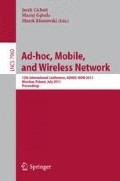Abstract
A distributed algorithm that solves energy efficient data gathering Weighted Spanning Tree Distributed Optimization (WSTDO) is proposed in this paper. It is based on an optimization performed locally on the data gathering spanning tree. WSTDO algorithm is compared to two centralized spanning tree optimization algorithms MITT and MLTTA. The performance of WSTDO achieves between one half and one third of the MITT performance and proves to be better than MLTTA. The performance depends on the density of the network. It works better for sparse networks. WSTDO has lower overhead than MITT and MLTTA for sparse networks. Though the proposed algorithm has a worse performance than MITT it has other features that over-weights this fact. It is able to perform optimization parallely in disjoint sub-trees and also during data gathering which allows a short data sampling period. It is also prone to link and node failures that can be solved locally.
Access this chapter
Tax calculation will be finalised at checkout
Purchases are for personal use only
Preview
Unable to display preview. Download preview PDF.
References
Burri, N., von Rickenbach, P., Wattenhofer, R.: Dozer: ultra-low power data gathering in sensor networks. In: Proceedings of the 6th International Conference on Information Processing in Sensor Networks, IPSN 2007, pp. 450–459. ACM, New York (2007)
Chang, E.J.H.: Echo algorithms: Depth parallel operations on general graphs. IEEE Trans. Software Eng. 8(4), 391–401 (1982)
Hariharan, S., Shroff, N.B.: On optimal energy efficient convergecasting in unreliable sensor networks with applications to target tracking. In: Proceedings of the MobiHoc 2011, pp. 24:1–24:10. ACM, New York (2011)
Ingelrest, F., Simplot-Ryl, D.: Localized broadcast incremental power protocol for wireless ad hoc networks. Wirel. Netw. 14(3), 309–319 (2008)
Jacquet, P., Muhlethaler, P., Clausen, T., Laouiti, A., Qayyum, A., Viennot, L.: Optimized link state routing protocol for ad hoc networks. In: Proceedings of the IEEE International Conference IEEE INMIC 2001, pp. 62–68 (2001)
Levin, L., Segal, M., Shpungin, H.: Energy efficient data gathering in multi-hop hierarchical wireless ad hoc networks. In: Proceedings of the 7th International Workshop on Foundations of Mobile Computing, FOMC 2011, pp. 62–69. ACM, New York (2011)
Liang, J., Wang, J., Cao, J., Chen, J., Lu, M.: An efficient algorithm for constructing maximum lifetime tree for data gathering without aggregation in wireless sensor networks. In: Proceedings of the 29th Conference on Information Communications, INFOCOM 2010, pp. 506–510. IEEE Press, Piscataway (2010)
Luo, D., Zhu, X., Wu, X., Chen, G.: Maximizing lifetime for the shortest path aggregation tree in wireless sensor networks. In: INFOCOM, pp. 1566–1574. IEEE (2011)
Onodera, K., Miyazaki, T.: An autonomous multicast-tree creation algorithm for wireless sensor networks. In: Proceedings of the Future Generation Communication and Networking, FGCN 2007, vol. 01, pp. 268–273. IEEE Computer Society, Washington, DC (2007)
Osterlind, F., Dunkels, A., Eriksson, J., Finne, N., Voigt, T.: Cross-level sensor network simulation with cooja. In: Proceedings of the 2006 31st IEEE Conference on Local Computer Networks, pp. 641–648 (November 2006)
Wieselthier, J., Nguyen, G., Ephremides, A.: On the construction of energy-efficient broadcast and multicast trees in wireless networks. In: INFOCOM 2000, vol. 2, pp. 585–594 (2000)
Yuan, J., Zhou, H., Chen, H.: Constructing maximum-lifetime data gathering tree without data aggregation for sensor networks. In: Lee, R. (ed.) Computer and Information Science 2011. SCI, vol. 364, pp. 47–57. Springer, Heidelberg (2011)
Zeng, W., Arora, A., Shroff, N.: Maximizing energy efficiency for convergecast via joint duty cycle and route optimization. In: Proceedings of the 29th Conference on Information Communications, INFOCOM 2010, pp. 16–20. IEEE Press, Piscataway (2010)
Author information
Authors and Affiliations
Editor information
Editors and Affiliations
Rights and permissions
Copyright information
© 2013 Springer-Verlag Berlin Heidelberg
About this paper
Cite this paper
Carr-Motyčková, L., Dryml, D. (2013). Distributed Energy Efficient Data Gathering without Aggregation via Spanning Tree Optimization. In: Cichoń, J., Gȩbala, M., Klonowski, M. (eds) Ad-hoc, Mobile, and Wireless Network. ADHOC-NOW 2013. Lecture Notes in Computer Science, vol 7960. Springer, Berlin, Heidelberg. https://doi.org/10.1007/978-3-642-39247-4_8
Download citation
DOI: https://doi.org/10.1007/978-3-642-39247-4_8
Publisher Name: Springer, Berlin, Heidelberg
Print ISBN: 978-3-642-39246-7
Online ISBN: 978-3-642-39247-4
eBook Packages: Computer ScienceComputer Science (R0)

